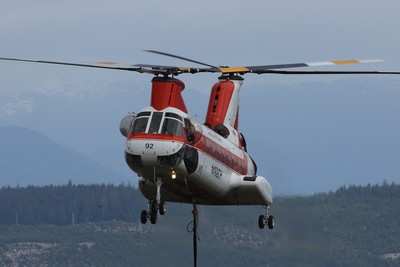Maintenance Contracts Part Of Success Through Recession
The helicopter industry in general has weathered the recession
better than the fixed-wing side, in part because of continued
military spending. But Columbia Helicopters, based in Aurora, OR,
has also found new ways to make money, and reports growth and a
boost in employment as a result.

“Our pursuit of commercial, and military helicopter
maintenance and operational contracts in new areas has resulted in
our ability to grow and hire more people,” says company
President Michael Fahey. “At the same time, we are
continually developing new contracts with our global petroleum and
logging customers."
Columbia Helicopters owns, operates, and maintains the largest
private fleet of heavy-lift helicopters in the world, consisting of
seven Columbia Model 234 Chinooks, and 14 Columbia 107-II, twin
engine, tandem-rotor aircraft. Capable of carrying loads in excess
of 26,000 pounds, the Columbia Model 234 Chinook has one of the
largest lifting capacities of any commercial helicopter. The
Columbia 107-II helicopter has a capacity of approximately 10,000
pounds. “Some of our Chinooks are operating in Peru and Papua
New Guinea, where global petroleum customers use those aircraft to
move heavy equipment, and support exploration operations in remote
jungles,” Fahey notes.

Columbia Helicopters reports hiring is up 12 percent over this
time a year ago, with nearly 200 jobs added since the end of 2009.
That includes 40 highly skilled men and women hired for the
company's maintenance operation since the beginning of 2011.
Columbia now has nearly 700 employees in its global operations,
with over 200 more employed by international subsidiaries or
affiliated support organizations.
According to Fahey, recent growth was largely fueled by the
entry into the military operations market for the first time, with
the deployment of five heavy-lift helicopters and support personnel
to Afghanistan on December 1, 2011. Under a multimillion dollar
contract with the United States Transportation Command, Columbia
Helicopters will operate from various locations throughout
Afghanistan in a non-tactical, logistics support role; ferrying
mail, personnel and supplies.
“The Afghanistan mission is a perfect fit for the skill
levels and expertise we have built up over our 55-year history, and
our understanding is that we are making a difference,” said
Fahey. “The military has repeatedly expressed great
appreciation of our operational tempo, high level of availability,
and the flexibility of our crews to perform our missions in a
timely, and very professional manner.”
In order to meet the demands of its growing global military
helicopter maintenance business, the company is now routinely
sending crews outside the US in order to assist customers with
routine maintenance. Currently, Columbia’s crews are working
for military organizations in Australia, Thailand, Singapore, Spain
and other locations. The company, in fact, has opened a maintenance
operation facility in Australia. Additionally, maintenance crews
have been dispatched to Afghanistan to work on deployed foreign
military aircraft.
In addition to the military, Columbia has historically worked
with a number of commercial customers, and has seen significant
growth in maintenance for both groups, particularly with those
using helicopters similar to the Columbia fleet.
To further enhance its maintenance and repair capabilities, the
company broke ground last summer on a new, $4 million engine test
facility at its Aurora base, slated to be fully operational later
this year. Capable of running the T55-714 engine, which powers
military CH-47 super heavy-lift helicopters around the world, the
test cell has been designed to accommodate future versions of that
engine, as well as other engine product lines.
“We are obviously pleased with our growth,” Fahey
said. “While we have grown conservatively, and do not expect
our business model to change, our Board of Directors and management
team will explore all opportunities when they present themselves,
and I am confident that we will continue to grow in the
future.”
 ANN's Daily Aero-Term (05.05.25): Circle To Runway (Runway Number)
ANN's Daily Aero-Term (05.05.25): Circle To Runway (Runway Number) ANN's Daily Aero-Linx (05.05.25)
ANN's Daily Aero-Linx (05.05.25) NTSB Prelim: De Havilland DHC-1
NTSB Prelim: De Havilland DHC-1 Classic Aero-TV: The Boeing Dreamliner -- Historic First Flight Coverage
Classic Aero-TV: The Boeing Dreamliner -- Historic First Flight Coverage Airborne-NextGen 05.06.25: AF Uncrewed Fighters, Drones v Planes, Joby Crew Test
Airborne-NextGen 05.06.25: AF Uncrewed Fighters, Drones v Planes, Joby Crew Test




